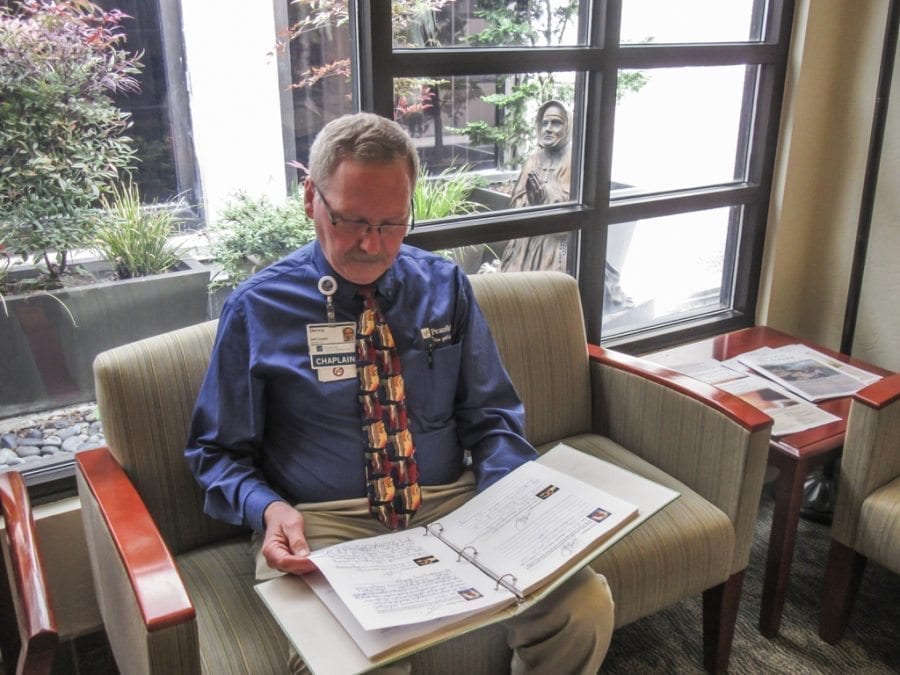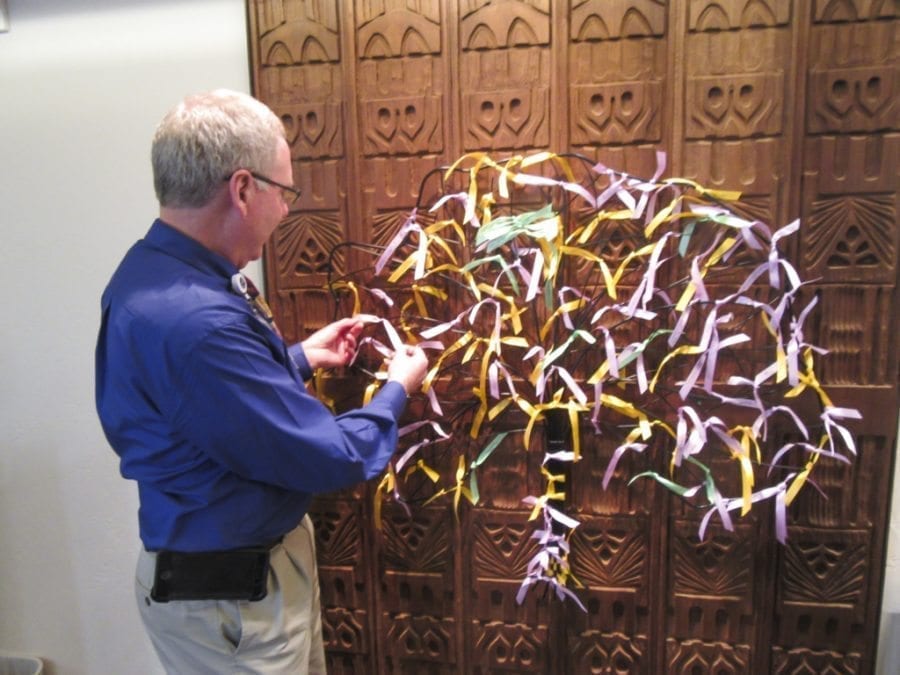VANCOUVER — “He was in ICU, and his doctor had just told him he may not make it through the night,” says PeaceHealth Southwest Chaplain Denny Nutter.
“And he had something on his conscience,’’ Nutter adds. “He’d lived with a woman for 30 years, and never popped the question. And he said he realized it was unfair to leave her with nothing. So he asked me, ‘Will you marry us this afternoon?’”
The man’s partner had gotten a license. But there’s a mandatory three-day waiting period in Washington after a license is issued before a couple can marry. And when Nutter looked at the license, he realized they couldn’t get married until the next day.
“So I told him, ‘I’ll come back at midnight,’” Nutter says, “‘and we’ll have the ceremony.’ So I came back at midnight. And the staff had gotten a wedding cake, and decorated the room. And their family was there. And I married them there in ICU. At midnight.”

It’s just one of many stories Nutter can tell. Recently, he was called to see a psychiatric patient thinking of suicide. The day after, he was doing a Blessing of Hands of staff members for National Nurses Week.
There’s a notebook in the chapel where people leave prayer requests. Nutter says he or another of the chaplains prays for them every day. He makes pre-surgery visits, praying with the patients that want him to. He sits in on hospice consults, and makes rounds.
“I say, ‘I’m Denny. I’m part of your care team. How can I support you today? I’m here to be a gofer.’ I’m there to serve them,’’ Nutter says. “To put them at ease and make them comfortable. I’ll ask them, ‘Do you have a particular faith tradition or religious background?’ And if they say no, I’m still here to be of support. If they’re another religion, we have a contact list. If they want a Buddhist priest, say, or last rites. But end-of-life patients, especially, seem to want to talk about spiritual things even though they may have no background. But they went to church when they were a kid, or they had an influential grandparent.”
Nutter tells about another patient he visited in ICU.
“As I was leaving I asked, ‘Would it be meaningful if I offered a prayer for you?’ But he didn’t want me to. And that was fine,’’ Nutter says. “The next day I stopped in, and he said, ‘Good to see you. And about that prayer. I suppose it wouldn’t hurt.’ And every day after that he asked me to say a prayer.”
But the key, Nutter says, is to find out what the patient or the family needs.
“We had a patient who had been a gunner in a bomber in World War Two,’’ Nutter says. “He’d been shot down twice, and been a POW. And the family said, ‘We have a special request.’”
So Nutter worked to make it happen: called the funeral home, got a flag, made arrangements for the veteran’s body to be taken to an alternate location in the hospital for pick-up by the funeral home. And after the man died, his body left the room covered with the American flag, with his family on either side acting as an honor guard.
“And the charge nurse had arranged that at every room along the hallway, there was a nurse in the doorway, standing at attention,” says Nutter, as the family escorted the flag-covered gurney out.
“The most important thing is being there,” he says. “Actions are more important than words. Sometimes it’s holding hands for an hour. Sometimes it’s crying with a person.”
Nutter is also a first responder for trauma patients and codes in the ER.
“You have absolutely no idea with a trauma or a code what you’ll encounter,’’ Nutter says. “Paraclete is a word for the Holy Spirit. It means comforter. And it’s similar to parallel, one being called alongside. I’m very grateful for the Paraclete. The Paraclete provides me with words I’m surprised at — or helps me keep my mouth zipped. I’m told I bring peace and calm to the ER.”

Nutter and his wife have been married for almost 45 years and have four children and nine grandchildren. He is head elder at Washougal’s Riverside Seventh Day Adventist Church, and also runs the sound system for another small congregation that rents the building on Sundays. In his free time he loves to cross country ski, and used to do para-gliding.
Nutter says maintaining his own private devotional time is key to being able to keep on giving.
Also important for Nutter is the Critical Incident Response Team (CIRT) at PeaceHealth, which gives caregivers the opportunity to talk with each other about a particularly difficult case and how it has affected them.
“When you walk in you drop all titles and just sit in that circle and debrief,’’ he says. “After a real tragic death in the ED (Emergency Department), at CIRT for the first time, I watched a gal who had spent 40 years as an EMT just start bawling. And I learned something really valuable. I recognized that to be professional at the time, you need to debrief after. Grieving is part of being human. CIRT was a huge part of my learning to know there’s a time and place to grieve, to take care of our emotions, so we can be there for patients and families. You have to learn to take care of yourself.”
At CIRT, Nutter says, “you see the price (caregivers) pay to continue to do their jobs. The huge sacrifice each caregiver makes.”
He’s speaking of the medical personnel he works with. But, Nutter could just as well be speaking of himself.




